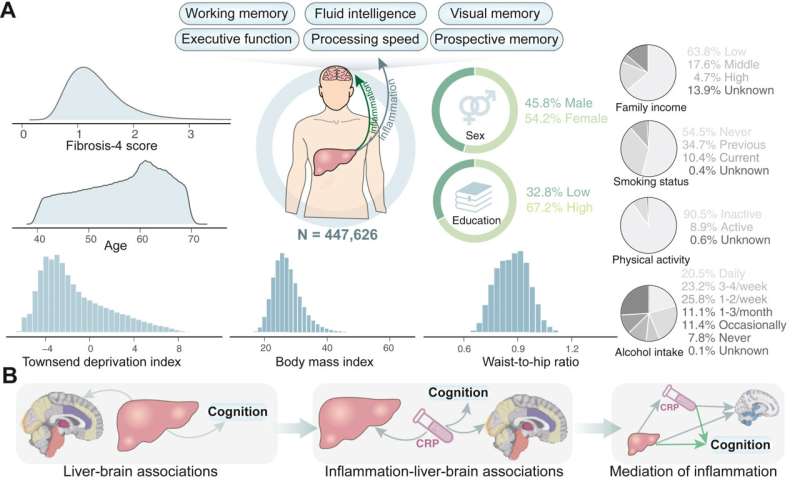This article has been reviewed according to Science X's editorial process and policies. Editors have highlighted the following attributes while ensuring the content's credibility:
fact-checked
peer-reviewed publication
trusted source
proofread
Liver fibrosis linked to reduced cognitive ability and brain volume

Yale researchers have found that liver fibrosis—scarring of the liver tissue that occurs in many chronic liver diseases—is associated with reduce cognitive ability and, in certain regions of the brain, reduced brain volume. And this connection may be mediated in part by inflammation.
The findings, researchers say, support the existence of a liver-brain axis and highlight the need for early surveillance of liver disease. The study was published June 23 in the journal eBioMedicine.
A growing body of scientific evidence is revealing that brain health and body health are interconnected, such that one often affects the other.
"More and more, folks are starting to realize that there's not this split between brain-based disorders and other types of physical health," said Dustin Scheinost, associate professor of radiology and biomedical imaging at Yale School of Medicine and senior author of the study. "We're starting to understand that liver disease, heart disease, and other diseases will have impacts on the brain, and brain disorders have impacts on the body."
For the new study, Scheinost and his colleagues used data from the UK Biobank—a compilation of health information from more than half a million adults—to better understand how liver fibrosis may affect the brain. The large dataset allowed the researchers to assess a potential liver-brain connection across a subset of the general population and to investigate effects that may be hard to detect in smaller datasets.
The researchers evaluated data on liver fibrosis, cognitive function—such as working memory, the ability to solve new problems, and processing speed—and gray matter volume in different regions of the brain. They found that, compared with healthy participants, those with liver fibrosis tended to have reduced cognitive ability and reduced gray matter volume in several brain regions, including the hippocampus, thalamus, striatum, and brain stem.
"There was a significant negative correlation between liver fibrosis and multiple cognitive functions, including working memory, prospective memory, and processing speed," said Rongtao Jiang, a postdoctoral associate in Scheinost's lab and lead author of the study.
With this type of study, the researchers could not establish cause and effect; they could only evaluate correlations. But they were able to explore what might mediate this connection between liver disease and brain health.
Inflammation is implicated in many liver and brain diseases and there are a small number of studies suggesting chronic inflammation related to liver disease can affect the brain. For the new study, researchers used a marker of systemic inflammation—a molecule called C-reactive protein—to determine whether inflammation might be a factor in the connection observed between liver fibrosis, cognition, and brain structure.
They found C-reactive protein levels were higher in participants with liver fibrosis than in those without and uncovered a small but significant mediating effect of C-reactive protein on the association between liver fibrosis, cognitive function, and brain volume. The findings, say the researchers, suggest inflammation may contribute, in part, to the link between the liver and brain. "In sum, our results support the existence of the liver-brain axis," said Jiang.
The findings also emphasize the need for early surveillance, he added. "Early-stage liver fibrosis is a reversible syndrome, and our current study suggests that early surveillance and prevention of liver disease may reduce cognitive decline and brain volume loss," said Jiang. "And since we found a mediating effect of systemic inflammation, it may tell us that drugs or interventions that target inflammation may help us prevent the disease burden of liver fibrosis."
The findings also offer evidence that preventing liver disease may help delay the progression of diseases like dementia and Alzheimer's disease, said Qinghao Liang, a co-author of the study and Ph.D. candidate in Scheinost's lab.
Emerging scientific evidence has linked liver disease to Alzheimer's disease. Previous research has shown that the amyloid-beta deposits implicated in Alzheimer's disease originate in and are filtered out of the blood by the liver. Liver dysfunction, therefore, may lead to insufficient amyloid-beta clearance and contribute to buildup in the brain.
The brain regions found in the current study to be most strongly associated with liver fibrosis—the hippocampus, thalamus, and striatum—are also often among the first brain regions to suffer volume loss in aging and early Alzheimer's disease.
Ultimately, the findings of the current study provide further evidence of a brain-body connection, said Scheinost. "It highlights how much physical health, mental health, and brain health all tie together," he said. "In some ways it's about taking care of yourself as a whole. Any piece of the puzzle you can address is probably going to have other downstream effects and benefits."
More information: Rongtao Jiang et al, Elevated C-reactive protein mediates the liver-brain axis: a preliminary study, eBioMedicine (2023). DOI: 10.1016/j.ebiom.2023.104679
















